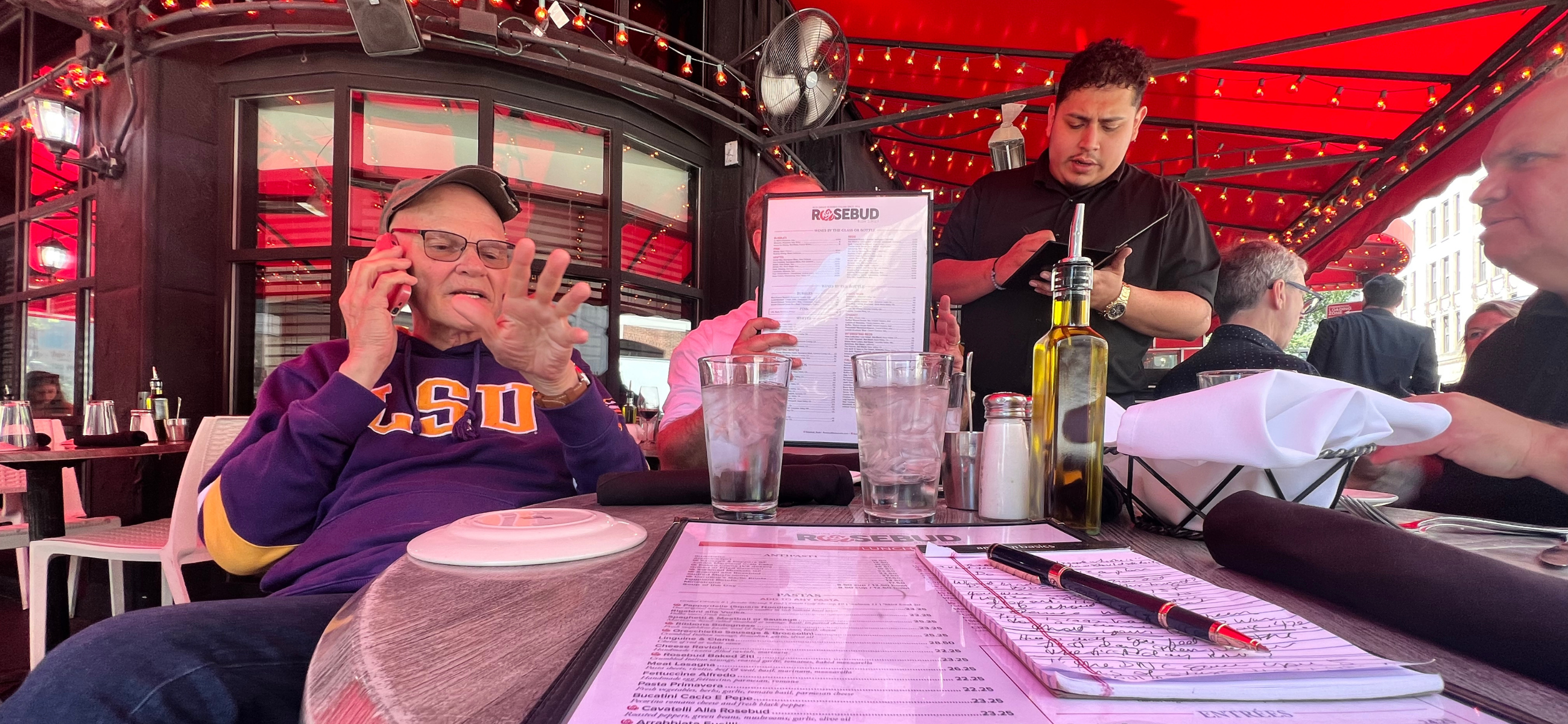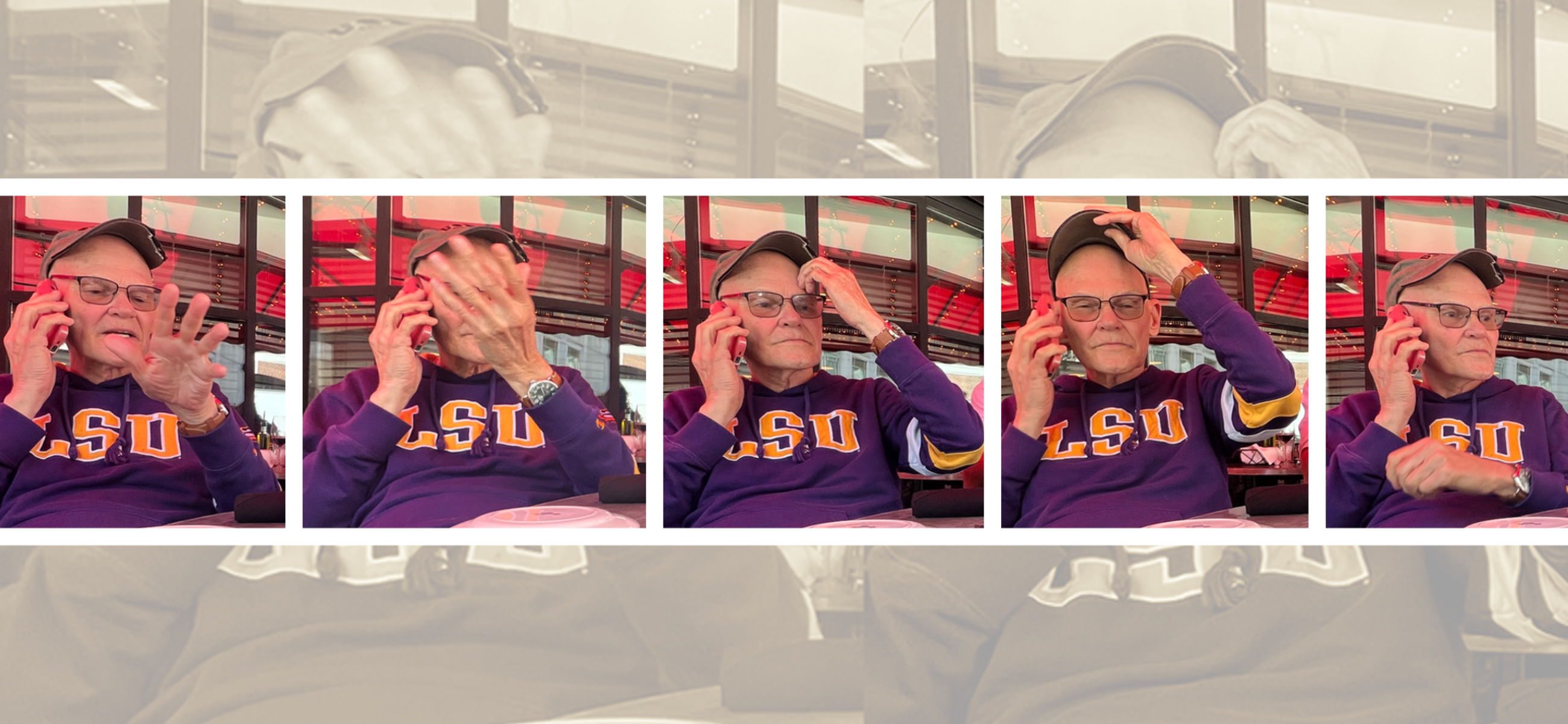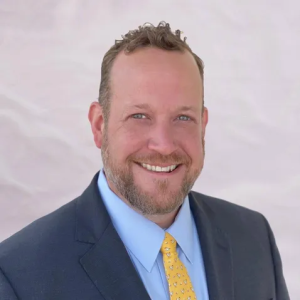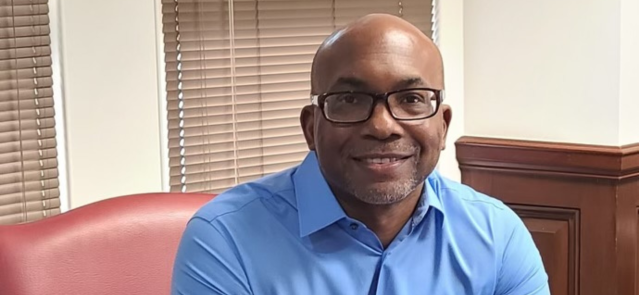Stay ahead of the curve as a political insider with deep policy analysis, daily briefings and policy-shaping tools.
Request a DemoThe DNC according to James Carville

James Carville fields calls at Rosebud in Chicago. (Credit: Jeremy Alford)
Approaching age 80, James Carville — the Democratic Party’s own Ragin’ Cajun — is preparing for the release of a documentary about his life’s work, reflecting on his decision to ask President Joe Biden to step down and embracing an age where he can “say anything I want.”
CHICAGO (Aug. 19, 2024) — Here comes James Carville.
Tall and thin. An unmissable head attached to an unstoppable mouth. Animated and kinetic. All worthy of lampoon on “Saturday Night Live.”
He moves up the street like someone who was reared in a place where grilled alligator is a tailgate staple at football games and Mardi Gras is a school holiday. Where redfish and catfish are caught with patience and coolers of beer are chased with stories that are at best downright lies, or at worst entertaining.
The man moves without care. Paid speeches, bestselling books, successful campaigns and a never-ending string of television and podcast appearances all pad his footing. The critics who call him out of touch or desperate for attention further float his stride.
Clad in his United States Marine Corps Semper Fi baseball cap and a purple-and-gold Louisiana State University hoodie, he has two old friends in tow. The destination is an Italian restaurant, Rosebud on Rush. That’s where the crush of political celebrity begins.

From passersby on East Superior Street to those already seated inside, there are nods of recognition and outstretched hands and remarks about forgotten campaigns. Carville has certainly come a long way since forging floor passes at the 1988 Democratic National Convention. (We’ll get to that later.)
The Ragin’ Cajun is clearly in his element, among his people. It’s the first day of the 2024 Democratic Convention in Chicago on Aug. 19, which also happens to be the birthday of former President Bill Clinton. Carville served as the lead strategist for Clinton’s unforgettable 1992 White House run, and ever since their respective stories have been intertwined. Later that night, Carville was planning to attend a reunion of the ’92 team.
One of the major storylines of this convention, however, is Carville’s relationship with President Joe Biden. Months ago, before the chorus grew louder, Carville called for Biden to step aside. From the moment he was standing practically alone on this appeal to the day Biden announced he wouldn’t seek reelection, Carville has enjoyed a resurgence of media impressions.
A 79-year-old resident of New Orleans, Carville books what he can. The New York Times, Fox News, The Guardian and The Washington Post have all knocked, among many others. Even when he’s on his own podcast, “Politics War Room,” Carville is making headlines. (He recently suggested certain Republicans “describe themselves as pro-Israel … because the Jews are whiter than the Palestinians.”) He also told CNN over the weekend that “[Donald] Trump don’t taste the same” since Vice President Kamala Harris entered the race.
With yet another interview to sit for, Carville asks for a table outside.
“Let’s get a bottle of red,” he says while taking a seat that faces the corner of North Rush and East Superior streets.
He’s still riding the high of that morning’s appearance on “Morning Joe” alongside Baton Rouge native Bradley Beychok, formerly of American Bridge 21st Century and now a founding partner of Lafayette Advisors.
“What an act!” Carville exclaimed upon sitting down, throwing his hands in the air. “What a Looziana act!”
The conversation turns to the newspaper business and small bayou towns before Carville mentions he’s entering a new season of his life, described plainly as “getting older.” His fortunes are no longer tied to the fates of others, and he only takes the work he wants.
“I ain’t got no boss,” Carville says, tipping his baseball cap back a bit. “I can say anything I want.”
Our interview with Carville has been edited for brevity and clarity.
Q. State Affairs: When you were on MSNBC this morning, you said Vice President Kamala Harris needed to tell her own story when she addresses the convention this week. What did you mean by that, and how should she go about accomplishing this goal?
“She needs to put her life and experience in context. You can’t go into one of these things assuming people know. Because generally they do not. If she can just get her life story across, it’s a success. You can’t expect too much out of these things. I’m really colored by the Clinton experience. In the spring of ’92, people thought he was a rich kid, a dilettante, a summers-in-the-south-of-France kind of guy. Once they found out he was raised in an ordinary place with a single mother and an abusive dad, that changed the room temperature. That was critical. Biography is a big part of this.”
Q. Do Democrats have a plan to win?
“It’s easy to have a plan. It’s harder to execute said plan. Anybody can come up with a path to victory, but how do you stay disciplined? How do you not get distracted? How do you stay focused? That’s the difference.”
Q. What kind of role should President Joe Biden play in this campaign after his convention speech?
“Pretty limited. So much of her message, by necessity, has to be forward looking. But I think it’ll be fine for him to make a few appearances and say there’s a record to build on, not sit on. I’ve said before the most thundering sound in all of politics is the sound of a turning page. That makes more racket than an August thunderstorm in New Orleans.”
Q. You asked Biden to drop out and not long after you discussed how it made you uncomfortable and you didn’t necessarily want to be out on that limb. As we sit here on the first day of the convention, how do you feel about it now?
“I’ll be honest. I felt like I did my duty. I was in a position most people are not. Most people have something to lose. The big advantage for me is no one can fire me. I don’t think I could have done this even 10 years ago.”
Q. Prior to 1992, had you attended a party convention?
“I went in ’84 in San Francisco, and then in ’88 in Atlanta. That’s when I was working for the governor of Pennsylvania and we had a printer just print up about a thousand floor passes. [Laughing]”
The crush of political celebrity again finds Carville.
“Oh my God! Hey!” said a man making his way to a nearby table with a group of enthusiastic Democrats, based on their T-shirts and buttons.
“How y’all doing?” Carville responded, happy to see them even if he didn’t know them.
“I’m sorry to interrupt. Are you doing an interview? My first campaign was Bill Clinton.”
“Alright!” Carville let out. “Okay!”
Others in the group quickly injected stories about campaigns from the 1990s and knocking on doors for Hillary Clinton.
“This is my guy!” the man says, clapping Carville’s back. “Harris needs to hire you!”
As the group disperses, the Ragin’ Cajun refocuses on his interview. These certainly weren’t the Democrats leaning into Carville when he first asked Biden to step aside.
“You think they mad at me?” he asks, laughing.
Q. You were telling me in ’88 you had a printer forge floor passes?
“Yeah! We cranked ’em out! They didn’t have all that detection stuff. We even made sure they all had the union bug!”
Q. What about the ’84 convention, your first convention? Where does your mind go when you think about that?
“I think about Mario Cuomo practicing his keynote in an empty hall. There were about 25 other people there and he didn’t care. He was practicing his lines and his pitch. He was practicing his timing. That taught me a lesson I told all my candidates. When you’re in front of the mirror, practice. When you’re in a car with what we call a body man, have him ask questions and practice. Practice, practice, practice. Timing is huge. Pauses are huge. For 45 minutes I watched this master orator practice his speech over and over and literally not give a shit.”
Q. Here you are 40 years later at your latest convention. What’s on your mind today?
“These things have become a form of security theater. There’s a lot of rigmarole, more rigmarole than anything else. I guess it’s the way we live now. It’s necessary. I’ve always kind of wondered how much longer these conventions are gonna last.”
Q. Why is that?
“There are so many crazy people out there who want to ruin things for everyone else. It’s just trouble. Right now we can do some good here, but the city has to raise money, it costs so much to get here and it’s a logistical nightmare. I don’t think we’ll see another convention in New Orleans or Florida in August because of the hurricanes. I could see a crapshoot in July, maybe.”
Q. As for next acts, I understand there’s a documentary about you coming out soon. What can you tell me about it?
“Frankly, it’s about me. The name is ‘Carville.’ We’re going to have an invitation-only screening in New Orleans at the Prytania on the 22nd of October. We open Labor Day weekend at a film festival that, all I can say, is in western Colorado. But it’s prestigious. We’ve also been accepted to a Middleburg, Virginia, festival and a Savannah festival. I haven’t seen it, but I’ll watch it in Colorado. Those who have seen it call it a postcard for the city of New Orleans. I think people are going to love the cinematography in it.”
Carville takes a break from the interview to order his food.
“I want a chopped salad to start and a bowl of minestrone with no cheese for the entree,” he says.
“You want me to bring out the soup and then the salad, sir?”
“No,” Carville says. “The salad, then the soup. Cold then hot.”
There’s time for one more question.
Q. Turning back to politics, if the DNC gave you five minutes on stage, what would you use that time for?
“No whining. No complaining. Stay focused. Don’t get ahead of yourself. We could lose this thing easily.”
Jeremy Alford is managing editor of LaPolitics Weekly/State Affairs. Reach him at [email protected] and @LaPoliticsNow.
Newly minted Senate Minority Leader Harold Jones II: ‘I’m not the typical back-slapping politician’
Nearly 10 years into legislative life, Sen. Harold Jones II wouldn’t change anything about the experience. “I love every minute of it. Even when I hate it, I love it,” the 55-year-old Augusta Democrat told State Affairs. Come January, Jones will add another role to his legislative duties: Senate minority leader, a job held for …
Gov. Kemp calls on state agencies to be fiscally restrained amid record $16.5B surplus
The Gist Gov. Brian Kemp asked the state’s 51 government agencies for continued fiscal restraint when drafting their amended fiscal year 2025 and 2026 budgets. Most agencies adhered to his request even as the state’s general fund surplus hit a record $16.5 billion last month. Forty-five agencies, excluding state courts, followed the governor’s instructions to …
Georgia defies bomb threats as election chief declares a “free, fair and fast” vote amid record turnout
ATLANTA – Despite dealing with over 60 bomb threats, Georgia’s election chief said Tuesday the state’s general election went smoothly. Georgia had a record turnout with nearly 5.3 million people voting, Secretary of State Brad Raffensperger told reporters. Election officials in the state’s 159 counties have until 5 p.m. to certify votes. “We had a …
In the (state)house: Meet the newest members of the Georgia legislature
When lawmakers reconvene at the state Capitol on Jan. 13, there’ll be a cadre of new faces in the 236-member Georgia General Assembly, one of the nation’s largest state legislatures. All 236 statehouse seats were up for election this year. Most candidates ran unopposed. Incumbents in contested races easily kept their seats, with the exception …




